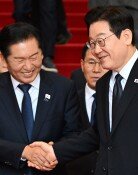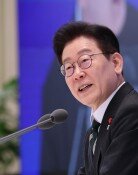[Column] President must vote for party head
[Column] President must vote for party head
Posted August. 29, 2000 13:39,
What is this Millennium Democratic Party`s national convention set to open tomorrow? As it is an important event that is supposed to show the country the new leadership that will hopefully succeed the current ruling party leadership, does it garner equivalent concern and expectation of the people? Or will it be yet another insiders-only celebration, which is largely ignored by the masses?
Although the members of the MDP might be resentful, I side with the underdogs. The reason is because the ruling party has, largely on its own, let slip the opportunity for it to provide a new vision and hope for the future to the people and demonstrate its effectiveness and authority.
Through two particular dealings, the MDP has driven the people out of its national convention.
The first is that they have incomprehensibly curtailed the meaning and purpose of the national convention by the party¡¯s proclamation that it would select a chairman for the top office but one who would be "unrelated to the candidacy question for the next presidential election and the party authority."
Is it comprehensible that a political party should put so much effort for the national convention then say to the people that the selections in the national convention have no relation to the future of the nation or the party?
It is not surprising that the people question why the ruling party is spending so much money to call all the representatives and participants from all over the nation for their convention, nor are the people much concerned with the result.
The revelation that President Kim Dae-Jung, who is the party president, would not vote in the highlight event of the national convention, the selection of the party chairman, also is questionable. The explanation that, "As the president of the party has the authority to name five members to the top post, there really is no need for him to vote," taken along with the statement, "The selection in the national convention has no relation to the upcoming presidential election," points to the one-man top-down chain of leadership with the party`s president have all authority to decide the ranking of the members for such important events as the formation of the party leadership and the selection of the party chairmanship.
Some have voiced the opinion that the real reason for President Kim abstaining from the voting process is to keep a middle-of-the-road position during the national convention. However, this also is a bit petty.
If a first-person secret voting process is guaranteed, none, even the president of a nation or a party, can breach that secrecy. This is a fact even the upper-grade elementary school children are well aware of. In such a secret voting process, a person needs to make a decision, keep that decision private and not influence others. There really is no need for the party president to worry and proclaim a middle-of-the-road position from the fear that his vote would cause others to follow his decision and influence the outcome of the election.
In a national convention by a democratic party, it is forbidden for anyone including the party president to make known whom he would voted for, nor can he stress to the members of the convention to vote for a certain member whom he supports. In an election, a person cannot even give a hint through indirect words or actions.
For the party president to abstain from voting because keeping his vote a secret would be such an impossible task only questions why they are having a national convention at all.
Even should the party president have no choice at all whatsoever to keep the middle position and abstain from voting, the wisdom of announcing the fact to the public must be questioned.
The fundamental foundation of a democracy is the free election, and it is possible and effective because all people have the right to vote. In schools, homes and societies, we teach that casting a ballot is the right of the citizens, as well as a responsibility, and it is considered a abandonment of duty to forfeit such ballots. There is a saying that without participation, there is no democracy.
However, the president of Korea, who should be the spearhead for participation in democracy and the free election process, refuses to vote, although it is only an in-party election. Keeping an impartial position could be done by watching his words and actions. He should be the first person to lay his office in line to have everyone keep the value and be an example, but will he forfeit his vote? If so, how could he possibly make a request to the people of the nation to go out and cast their ballots or criticize the younger generation for not voting?
It is a shame that the national convention, which could be carried out in an atmosphere of festivity, has been so marred and topsy-turvy.
As the ruling party still has two and half years of office remaining, it is important for them to avoid turning people away from their "celebration," yet it seems they are purposefully doing so.
Why? Although there are several reasons, one thing is clear. The current ruling authority is fearful of the rise of the new leadership within the party. With two and half years left, if a successor is named and begins to flex his political muscles, the president soon might become a lame duck. This was the greatest factor for the ruling party to announce that the selection of the party leadership would be unrelated to the presidential election candidacy, and as the in-party squabbling increased even so, the party president has announced he would abstain from voting.
However, should the president ignore democratic fundamentals because of his fear of becoming a lame duck? No. President Kim must cast his ballot for the election of the party chairman. He also must follow the collective desire of the conventional members to establish the board of party directors.







